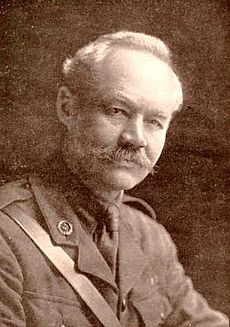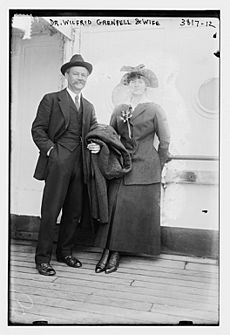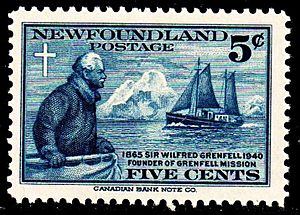Wilfred Grenfell facts for kids
Sir Wilfred Thomason Grenfell (born February 28, 1865 – died October 9, 1940) was a British doctor and missionary. He is famous for his important work helping people in Newfoundland and Labrador, Canada. He also wrote many books about his experiences.
Contents
Early Life and Learning
Wilfred Grenfell was born in Parkgate, England, on February 28, 1865. His father, Reverend Algernon Sidney Grenfell, was a headmaster.
In 1882, Wilfred moved to London. There, he started studying medicine at a medical school called the London Hospital Medical College. He learned a lot from his teacher, Sir Frederick Treves. Wilfred finished his medical studies in 1888.
His Amazing Work
In 1892, a group called The Royal National Mission to Deep Sea Fishermen sent Dr. Grenfell to Newfoundland. His main goal was to help the fishermen and other people living along the coast.
Helping People in Labrador
Dr. Grenfell started his mission in 1892. He brought two nurses and two doctors to open hospitals. First, he opened a hospital in Indian Harbour, Labrador. Later, he opened more small hospitals along the coast.
His work grew far beyond just medical care. He also helped start schools, an orphanage, and projects to help people find work. He even helped an Inuit girl named Kirkina Mucko. He helped her get artificial limbs and later, his mission helped her train to become a nurse.
The Reindeer Story
In 1907, Dr. Grenfell brought about 300 reindeer from Norway to Newfoundland. He hoped they would provide food and help people travel. However, some of these reindeer carried a tiny worm inside them. This worm then spread to the native caribou herds.
The reindeer herd eventually disappeared. But the worm stayed and caused a brain disease in the caribou. This disease was already known in reindeer in other parts of the world.
Caught on the Ice
In 1908, Dr. Grenfell had a very dangerous adventure. He was traveling with his dog team to help someone in a village. He got stuck on broken ice, called "slob ice." He managed to get onto a large piece of ice with his dogs.
He was forced to make a very difficult choice. To survive the freezing cold, he had to sacrifice some of his dogs to make a warm coat. After drifting for several days without food or water, local villagers finally rescued him. He later buried the dogs and put up a plaque that said, "Who gave their lives for me."
The Grenfell Association
By 1914, Dr. Grenfell's mission was known all over the world. To help manage everything, the International Grenfell Association was created. This was a non-profit group that supported his work.
This association provided healthcare and social services in northern Newfoundland and Labrador until 1981. After that, a government agency took over. The International Grenfell Association then focused on giving money and scholarships for medical training.
For all his years of helping people, the King honored Dr. Grenfell in 1927. He was given the title of "Sir."
A Role in a Movie
In 1931, Dr. Grenfell had a small part in a movie called The Viking. He spoke at the beginning of the film. He also talked about a sad accident that happened during the movie's making. The ship where they were filming, the SS Viking, exploded. This terrible event killed 28 people, including the film's producer.
Personal Life
In 1909, Wilfred Grenfell married Anne Elizabeth Caldwell MacClanahan from Chicago. They had three children. After his work in Newfoundland, they retired to Vermont.
Anne was very involved in Dr. Grenfell's work. She helped organize his trips to raise money and his talks. She also helped edit his books and get scholarships for local children to go to school. Anne was ill towards the end of her life, but she kept her pain hidden to care for her husband until she passed away in 1938.
Death and Lasting Impact
Sir Wilfred Grenfell died on October 9, 1940, in Vermont. His ashes were brought back to St. Anthony, Newfoundland. They were placed inside a rock overlooking the harbor, a place he loved.
Remembering His Work
In 1978, the Sir Wilfred Thomason Grenfell Historical Society was formed. This group bought Grenfell's home in St. Anthony. They turned it into a museum and archive.
In 1997, an interpretation center was opened in St. Anthony. This center helps thousands of visitors each year learn about Sir Wilfred Grenfell's amazing work and his lasting impact.
In 1979, a college campus of Memorial University was renamed to honor him. Today, it is known as Grenfell Campus, Memorial University of Newfoundland.
Dr. Grenfell is also honored on October 9th in the church calendar of the Episcopal Church.
Inspiring Stories
Sir Wilfred Grenfell was such a unique person that he inspired characters in books. Two characters in Canadian literature, Dr. Luke and Dr. Tocsin, were based on him.
A book about his life for young people was written in 1942 by Genevieve Fox.
Grenfell Cloth
A special fabric was created for Sir Wilfred Grenfell by a mill owner named Walter Haythornthwaite. This cloth was designed to be strong and warm, perfect for the harsh weather in Labrador. It became known as 'Grenfell Cloth' in 1923. Even today, this special fabric is used for clothing.
Awards and Honors
Sir Wilfred Grenfell received many awards for his service:
- Companion of the Most Distinguished Order of St. Michael and St. George – 1907
- Honorary Doctorate of Medicine from the University of Oxford – 1907 (he was the first person to receive this)
- Murchison Prize from the Royal Geographical Society – 1911 (for his maps of Labrador)
- Knighthood – 1927 (for his medical, educational, and social work)
- Honorary Knight for Life, Loyal Knights of the Round Table, Fifth Rank – 1928 (for great service to humanity)
- Induction into the Canadian Medical Hall of Fame – 1997
See also
 In Spanish: Wilfred Grenfell para niños
In Spanish: Wilfred Grenfell para niños
- CCGS Sir Wilfred Grenfell
Images for kids
 | John T. Biggers |
 | Thomas Blackshear |
 | Mark Bradford |
 | Beverly Buchanan |







